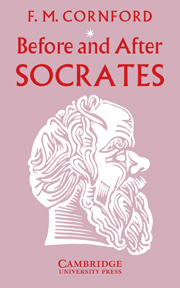II - SOCRATES
Published online by Cambridge University Press: 05 August 2014
Summary
We have considered the Ionian science of Nature—the germ from which all European science has since developed—as marking the achievement of an attitude of mind in which the object has been completely detached from the subject and can be contemplated by thought disengaged from the interests of action. The fruits of this attitude were the first systems of the world that can claim to be rational constructions of reality. We now come to the question, why they did not satisfy the expectations of Socrates. If the thought of these Ionians was genuinely philosophic, if they aimed at an entirely rational picture of the real, why did they disappoint a man whom the world has recognised as a great philosopher and who exalted the reason above all other faculties of man?
All our credible authorities—Plato, Xenophon, Aristotle—agree in asserting that Socrates, after his youthful disillusionment as to the methods and results of physical inquiry, never discussed such questions as the origin of the world. Xenophon adds some reasons. Did men of science imagine they understood human concerns so well that they could afford to neglect them for the study of things outside man's sphere and beyond his power of discovering the truth? They did not even agree among themselves, but contradicted one another on fundamental points. Did they hope, by studying the heavens, to control the weather; or were they content to know how the wind comes to blow and the rain to fall?
- Type
- Chapter
- Information
- Before and after Socrates , pp. 29 - 53Publisher: Cambridge University PressPrint publication year: 1932
- 1
- Cited by



